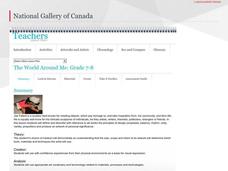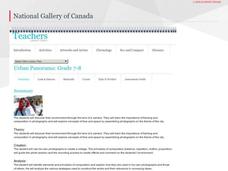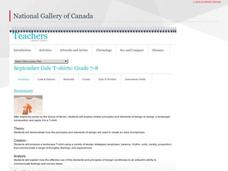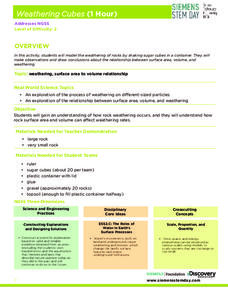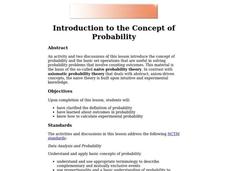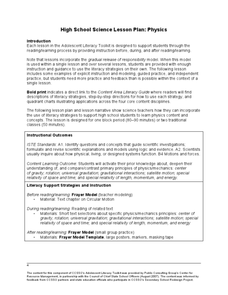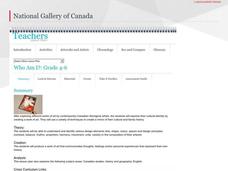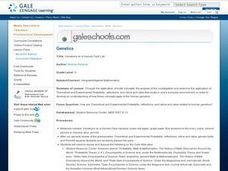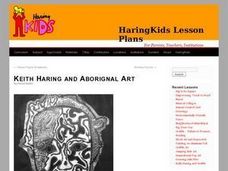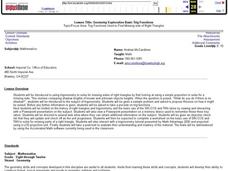National Gallery of Canada
Memories of the Past
Explore contemporary American Indian art. After viewing a set of images, class members discuss the design elements of techniques present, as well as how these artists represent history and culture. Learners examine the parfleche and...
National Gallery of Canada
The World Around Me
Have your learners use their surroundings as inspiration for an art project. Class members first examine and discuss art. They then choose an area and spend five days taking down observations in written and sketch form. These...
National Gallery of Canada
Urban Panorama
How can a photographer use images to represent a topic? Over the course of three days, learners discuss various photographs and practice their picture-taking skills with an outdoor, panoramic photography session. They use the images to...
National Gallery of Canada
September Gale T-Shirts
Focus on the principles of design with a wearable landscape art project. The plan provides definitions to share and art to examine. After students have a grasp of the principles, they draw a scene to eventually transfer onto a T-shirt....
Chymist
The Solubility of a Salt in Water at Various Temperatures
An educational lesson allows young chemists to test the solubility of different types of salt at various temperatures. Groups create a graph using data from unsaturated, saturated, and supersaturated solutions.
Virginia Department of Education
Moles Lab Activities
Want my name and number? It's 6.0221415 times 10 to the 23rd, and my name is Avogadro. Providing nine different activities, experiments, and labs, this lesson plan keeps Avogadro relevant to your class all year long.
Virginia Department of Education
Molar Volume of a Gas
What is a chemist's favorite plant? Stoichiome Tree! Scholars produce hydrogen gas by reacting magnesium with hydrochloric acid. Then they calculate the molar volume of the gas produced before answering assessment questions.
Chymist
Empirical Formula of a Compound
Because of the work of John Dalton, we are able to write formulas for compounds. The hands-on experiment has scholars prepare a compound from its elements. Using mass data, individuals write the empirical formula for the compound.
Discovery Education
Weathering Cubes
Weathering is not necessarily a result of the weather. Scholars conduct an experiment to explore the effect of surface area and volume on the weathering process. They create their own sugar cube rocks using the same number of cubes—but...
Curated OER
Introduction to the Concept of Probability
Middle and high schoolers have a clarified definition of probability, they explore about outcomes in probability and how to calculate experimental probability. They use computers to learn about probability.
Curated OER
Circular Motion
Twelfth graders discuss centrifugal force, frictional force, and critical speed as it relates to the popular amusement park ride, the Gravitron.
Curated OER
Earth Egg
Students discuss plate tectonics and the layers of the earth's interior. They use eggs as models of the earth and answer questions regarding which part of the egg would represent which part of the earth.
National Gallery of Canada
Who Am I?
Connect design elements and principles to identity a culture with a discussion and related art activity. After analyzing artwork in relation to design, class members talk about personal and cultural identity. Using items that represent...
Curated OER
Variations on a Human Face Lab
Ninth graders gain an application level understanding of probability, symmetry, and ratios and rates that exists in one's everyday environment relative to human genetics.
Curated OER
Keith Haring And Aboriginal Art
Students explore the art of Keith Haring and examine how it relates to Aboriginal art. In this fundamentals of art lesson, students examine the fundamental elements of art, such as, line, symmetry, contrast, balance, color tints, and...
Curated OER
How Stuff Is Put Together (Chemical Bonding)
Fourth graders participate in a simple experiment that shows the ratio of elements that make up water.
Curated OER
Design Project: Radio Transmitter
For this electrical circuit worksheet, students research the Federal Communication Commission to determine the regulations for a non-license radio transmitter. They will answer a series of another 3 questions to show an understanding of...
Curated OER
Ideas That Lead to Probability
Students explore and define the concept of probability. They utilize a random number generator to determine the fairness of a game. Internet and printable versions fo the activities are included.
Curated OER
Gravity Gets You Down
Students investigate the force of gravity and how it effects different objects that are put into acceleration when applied the experiment of free falling. They drop different objects that have a variety of masses and some that cause air...
Curated OER
Geometry Exploration Basic Trig Functions
Tenth graders solve for missing sides on a triangle using the Pythagorean Theorem. In this geometry lesson, 10th graders are introduced to basic trigonometry functions as they solve problems of right triangles. They discuss the formulas...
Curated OER
War and Religion
Students examine world conflicts. In this War on Terrorism lesson, students investigate the criteria of just wars and then determine whether the War on Terrorism fits into the category.
Curated OER
Electrical Noise and Interference
In this electronics worksheet, students identify and differentiate the different types of noise. They complete 4 short answer questions about the topic.
Curated OER
The Discovery of Ohm's Law
Students study Georg Ohm and how he changed mathematics with his law. In this experimental evidence and stastics lesson students complete an experiment on the characteristics of Ohm's law.
Curated OER
The Water Detectives
Students collect water samples from designated sampling stations, and discuss water pollution. They analyze the water samples, record the data on a spreadsheet, and present the environmental water quality data to the class.



